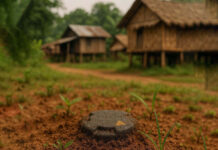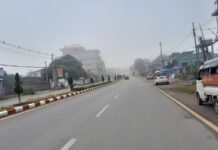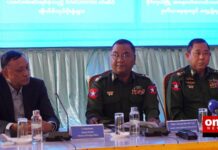(12-15 December 2016)
Every man is my superior in some way
In that I learn from him.
Ralph Waldo Emerson (1803-1882)
Since the last Shan Drug Watch annual report was published in June 2012, I have written only a few articles on the drug situation in Shan State. One obvious reason was the reconciliatory climate required by the peace process didn’t go well with the hostile nature of the drug issue. Another reason, equally compelling, was I no longer have time and resources to continue my involvement in the subject.
Things have changed since. For one thing, drugs continue to plague the country and its people, despite the peace process. And for another, it has become plainer than ever that the peace process cannot be separated from the drug issue, long been associated with politics and war in the country. We can therefore no more work separately for the resolution of the drug problem than we can for peace. Few know better than me about that.
So when early in November I was asked whether I could take part in the informal dialogue that was to take place in Chiange Saen, right at the Golden Triangle, my answer was a simple Yes.
My contribution to the event was quite negligible, having been out of touch for 5 years. On the other hand, I have learned a lot from the more than 40 participants, many of them my sons’ age level.
The following journal comes from my notes taken there. Any mistakes in the reporting therefore are mine alone.

Day One. Tuesday, 12 December 2017
If corruption is not excised, we will be defeated even before we go into battle.
Retired Maj Gen Luo Yuan, one of China’s most widely read military figures, Reuters/BP, 20 August 2014
Today most of the participants are visiting Doi Tung, where development projects for hill tribes have been taking place since 1988 under the patronage of the late Princess Mother Srinagrindra. The lobby of the Imperial Golden Triangle Hotel, just 100 meters from the Burmese side and 300 meters from Laos across the Mekong, therefore is empty except for me checking in.

But at 18:00, all of us are down there waiting for the minibuses to take us to the restaurant for dinner.
According to the invitation, the event has been jointly organized by the Netherlands based Transnational Institute (TNI), Germany’s GIZ (don’t ask me what it stands for because I’m an illiterate in German), Thailand’s Office of the Narcotics Control Board (ONCB) and the Mae Fa Luang Foundation.
Participants include those from Cambodia, China, UK, Indonesia, Peru, Colombia, UNODC and, of course, Thailand and Myanmar. We are all sorry to be informed that Myanmar’s CCDAC (Central Committee for Drug Abuse Control) could not join the dialogue, as it is reportedly not easy for its officials to get permission to leave the country.
I sit with my young friends from Shan State who tell me that the prevailing mood at a recent seminar organized by UNDP in Taunggyi was to go for the Duterte formula. “Most participants said the proposed amended law only fits in with matured democracies, “ says one. “Not our country that is still an apprentice in democracy. They say the 1993 drug law, though tougher, is more suited.”
So far, the new bill that designates users as patients and not as criminals, is yet to be adopted. “Still the Lower House is not satisfied. It still wants to punish anyone carrying a few pills of meth.”
Having read reports from public consultations conducted by the Restoration Council of Shan State/Shan State Army (RCSS/SSA), where people were saying, “Any political party that wants votes from us need not waste time making campaign speeches. Just save our kids from drugs. That’s all we’re asking,” I’m not really surprised.
Another well known popular expression on the subject is the vigilante like Pat Jasan movement in Kachin State, where angry youths are rampaging the countryside against poppy growers and drug pushers. “Considering the enormity of the problem, you can’t really blame them acting this way,” says another.
At 19:00 we are back to the hotel.
Day Two. Wednesday, 13 December 2017
You should be one of the most politically powerful countries in the region, and you are not because, amongst other factors, there is no peace.
Roland Kobia, former EU ambassador, speaking at a function in Yangon, 8 May 2014, Mizzima News
We have 4 sessions today, 2 in the morning and 2 in the afternoon. And here are the notes I have taken:

Session I. Overview
- Drug use on the increase in Asean
- 87% of yaba (meth) in Thailand comes from the north, and 13% from the northeast. ‘Getting tough’ sentiment is on the rise in the Kingdom, despite policy reform process
- Cambodia not a production source. Like Thailand, it is another transit country.
- Myanmar has been reviewing its 1993 drug law since 2015. In 2017, the new bill was released for public review. (“The cart is still going before the horse in our country. It is top down, not coming from the ground level”)
Session II
Alternative Development (AD) and access to land in (ex-) opium poppy growing areas.
- In its annual Southeast Asia Opium Survey, UNODC has noted that lack of access to land is an important driver of illicit opium cultivation in the region. Right to land has become a big issue.
- Thailand used to have 8,000 acres of poppy fields. Now it has been reduced to 200, mainly in Om Koi district of Chiangmai province
- UNODC Fact Sheet: Large reductions in poppy cultivation have occurred in East Shan (-37%) and South Shan (-29%), but in North Shan and Kachin, cultivation has remained relatively stable (-3% and -7% respectively)
Note
A young Civil Society activist from East Shan questions the figures. According to him and two of my sources, whom I make phone calls to inquire, cultivation in South Shan was indeed down. Reasons: fewer buyers, low prices (From K 700,000 to K 300,000) and poor quality of the product, together with the vagaries of the weather. But in East Shan, it may be even up, but not down. The prices are B 20,000-30,000.
“At first, the authorities said the farmers could not grow. But later they changed their minds and said, ‘if you don’t grow it, what are you going to eat?’ Of course when poppy fields returned to the hills, farmers had to pay tax to the authorities.”
- On land grabbing: “So what is law is Myanmar?” Another from South Shan asks rhetorically. “It means ‘if I (authorities) do it, it’s legal. But if you (ordinary people) do it, it’s illegal.”
During lunch break, someone tells me the CCDAC has launched AD in Panglawng/Pinlaung, the township where the former home minister Lt-Gen Ko Ko told me in 2013, “When I ordered them to stop it, they did. A few months later they came to me asking for rice, as they didn’t have any money to buy it.”
Session III. Rural development in fragile context
- When the peace process is fragile, everything connected to it will be just as fragile, and vice versa. On the other hand, when the peace process is robust, everything linking to it will be just as robust, and vice versa.
It means just as we are working together for peace, we should also be working together to solve the drug problem.
Significantly, what I’m saying is in line with the NCA, particularly Paragraphs 9.a, 9.p, 25 (1) and 25 (6) plus the Preamble which recognizes, reinforces and reaffirms all previous agreements
- Drugs cannot wait for peace. In fact, dealing with drugs jointly and in harmony may be the way to peace
- Chinese investments. Do they help?
No. Corruption on China’s side, when companies apply for loans. Rubber plantation projects they introduced move people downhill to become rubber plantation workers. And when prices collapsed, they suffered. You have to remember also that most rubber plantations are not in poppy areas.
During tea break, my young friends tell me that there is a lot of hard feelings toward Chinese investors for 3 reasons: they employ only Chinese workers, they take local women as wives and usually leave them behind or sell them to others when they leave, and many of them are also involved in drug trafficking.
Note
It proves once again that informal meetings are important. But that coffee/tea/lunch breaks are even more so.
Session IV: Community involvement
- Poppy farmers and drug users today continue to be marginalized in the drug debate and their voices are insufficiently heard.
- A locally driven movement known as Pat Jasan is eradicating poppy fields from smallholders and arresting drug users, forcing them into “rehabilitation” camps. The problem is that they (the Pat Jasan members) don’t go to the root cause.
This first day finishes quite late, 18:00 instead of 17:30. It is however compensated by a sumptuous dinner at the restaurant opposite the hotel.

Day Three. Thursday, 14 December 2017
Nature doesn’t need people. People need nature.
That is why we can’t save ourselves without saving nature.
Harrison Ford, Bangkok Post, 14 April 2014
We have 4 more sessions today. As yesterday, I try to learn the best I can.
Session V. Treatment and harm reduction options for methamphetamine use and other stimulants.
- According to WHO, 89% of the meth users do not experience problematic use, as the majority of users only use it during specific period in their lives and manages to self-regulate their use. The remaining 11% however develop more problematic patterns of meth use. (It is certainly a shock for those of us in Thailand and Burma to learn that there is a non-problematic way to use meth, isn’t it?)
Session VI
UNGASS innovations
- The UN General Assembly Special Sessions (UNGASS) on drugs, convened at a 10 year interval since 1998, was initially due to meet for the third time in 2019. But a tripartite call by Colombia, Guatemala and Mexico for drug policy reform had necessitated the convening three years in advance.
- Among the Asean members, Myanmar as well as Brunei, Vietnam and Asean itself had reaffirmed their ambitions for a drug free society. Singapore went further to declare itself drug free.
- UNGASS 2016 was a big moment for drug policy reform. The challenge is to maintain the momentum.
- A success story is reported by Malaysia with the following statistics:
*Locked up down from 58.3% to 25.1%
*Imprisonment down from 57% to 9.1%
*Rehabilitation down from 27.6% to 1.6%
During lunch break, I learn what the Civil Society thinks of the UN. “Among UN agencies, we can only work with World Food Program (WFP), Food and Agriculture Organization (FAO) and UN Women,” says one young participant. “We boycott the rest.”
Among its complaints, they say, is about the Myanmar pay rate for Myanmar local staff. I don’t ask for the details.
Session VII
Asean work plan on drugs and cooperation mechanism
- In May this year Asean adopted the Mekong MoU sub-regional action plan. It adopts the approach endorsed at the April 2016 UNGASS, addresses challenges in 4 thematic areas: drugs and health; law enforcement cooperation, legal and judicial cooperation; and sustainable AD. It also connects the Action plan with Sustainable Development Goals (SDGs) and the Post 2030 Development Agenda.
- On the negative side:
*Decriminalization still in debate in Asean.
*Cooperation still weak.
Session VIII Feedback and suggestions for follow-up
- In need of trust building among Asean member nations
- Also in need to include input from communities
- Inclusion of EAOs in next year’s informal dialogue
- Cooperation between UNODC and the CSOs. “At the ‘sky level,’ the UNODC may know more than the CSOs, but at the ground level, they know more than the UNODC”

Day Four. Friday, 15 December 2017
There are many educated people among the authorities.
But no matter how educated one is, if one’s views are jaundiced, the country will never develop.
MP Nang Kham Aye, 3 October 2012, SHAN
Today, about half of the original 48 participants are gone. The rest stay behind for a special workshop on “Human Rights and Illicit Cultivation”. I’m one of them. But I’ll be there for only half a day.
Like the past two days, 4 sessions have been marked: Illicit Cultivation; Proper sequencing in AD; Indigenous, cultural and traditional uses; and Criminal justice and subsistence level illicit cultivation.
Session I. Human Rights and illicit cultivation
- Any drug policy must be people-centered
- Human rights and drug control treaties are still running counter to each other
- Human rights are not something to take into account, not just a moral duty, but a legal obligation
- Need to decriminalize rural populations for exercising their human right to be free from hunger
- Right to land still not an international recognized right
- We all know that meth comes from ephedrine, and that ephedrine comes from ephedra plants.
But in China, one whole village was arrested for producing meth, while all the ephedra fields around it were left untouched. The reason is while ephedrine is a controlled substance, ephedra is not.
Couldn’t this logic be applied to poppy and coca too?
During coffee break, the discussions continue, and here’s what I learn:
- Thailand is buying some 10 tons of opium per year while destroying poppy fields in Chiangmai each year
- Bhutan is full of wild growing marijuana plants. Nobody’s destroying them. Use by humans until recently has been rare. (But now, introduced by the media, both regular and social, rates of use among youths are increasing)
- Farmers are asking: should laws be made for the people, or people be made for the laws?
Companies want us to grow more potatoes, but when we grow more, the prices go down and we’re back to poppy cultivation again.
Session II
Proper sequencing in alternative development
- How does compliance with human rights (“the right of everyone to an adequate standard of living” and “the fundamental right of everyone to be free from hunger”) relate to the debate about proper sequencing of eradication and AD measures, and about conditioning the provision of development aid prior to elimination of illicit cultivation?
- The assumption that people grow opium is because they are poor is superficial. The real causes are lack of infrastructure, armed conflicts and others
For them, opium is a “gift from heaven”. It can be grown and harvested in 100 days, not perishable for 20 years, and easy access to credit.
- Good governance is also important. During the British days, there was peace in the non-Burman areas, because the British observed the agreements made with them. There were only 6 infantry battalions with only a few British officers. We all lived in peace together. Now we have some 200 battalions in Shan State alone, and there isn’t peace. To achieve peace, there must be justice. Justice means ‘one for you and one for me’. If this ‘more for me and less for you’ continues, there’ll be no peace. And without peace, nothing else can be done.
- The peace process can be exploited by the business sector. (One the other hand, it must be noted that there are also ‘business for peace’ platforms professing to engage in private-public dialogue in order to establish local priorities and implement projects)
During the two sessions, I also manage to pick up some quotable quotes:
- ‘War on Drugs’ is ‘War on drug users’
- There have been comments about ‘Jurassic drug treaties’
- AD projects in Thailand are successful, because you in Thailand have parents. But we in Myanmar only have step parents.
By 13:00, I’m ready to leave, as a domestic event is waiting for me. After all, drugs can do without me, but my home affairs cannot—at least for the time being.












Leave a Comments